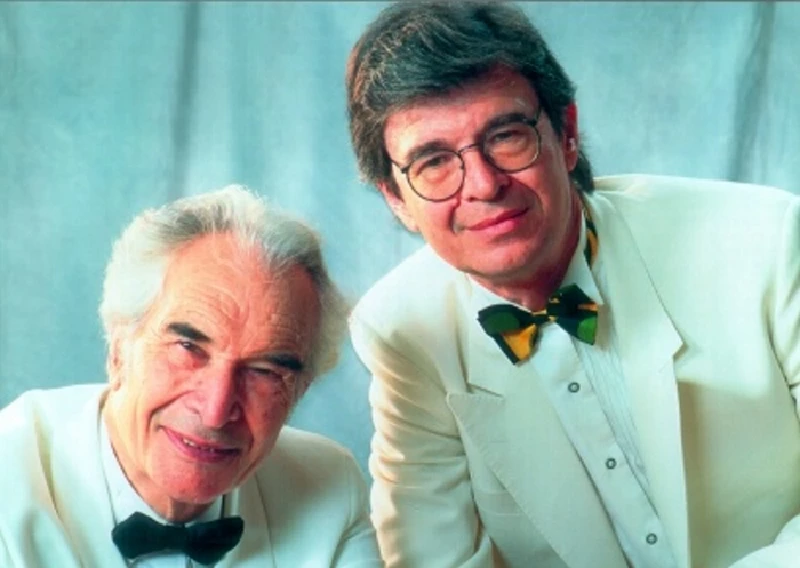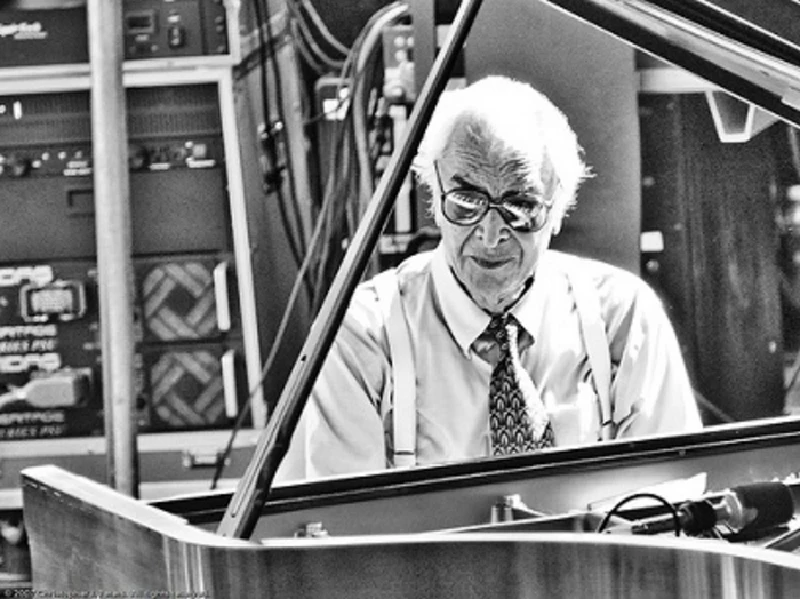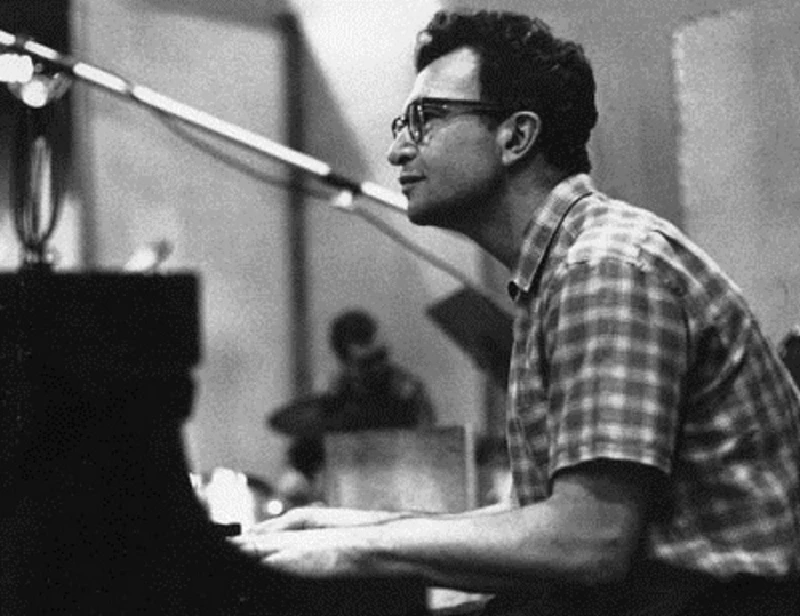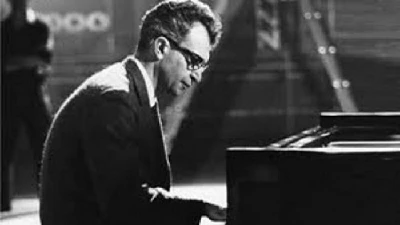Dave Brubeck - Interview
by Lisa Torem
published: 21 / 1 / 2011

intro
Jazz pianist and composer Dave Brubeck talks to Lisa Torem about his nearly seventy years long musical career, while his son Darius pays personal testimony to his father
The first thing I notice when I look at press photos of jazz pianist/composer, Dave Brubeck, is that he is always wearing a crisp shirt and a beautifully tailored suit or tuxedo jacket. These photos remind you how different the world was once upon a time. You won’t catch his eyes drifting away from the lens either. In fact, when his strong fingers spread across the keyboard to create those intelligent, emphatic voicings, he seems so enraptured, so enthralled with the massive, shimmering instrument; you would swear he’s flirting with a shy lady at a dance hall. It’s possible that Dave looks this comfortable because he grew up in a musical household. Two older brothers went professional, and as a young man, he worked intensively with his mother to learn the piano. But, his family’s desire to relocate to a cattle ranch in the mountains of California might have derailed his muse. At twelve, Dave’s hands would be more engaged in herding cattle and spreading feed than tinkling ivories. By fourteen, Brubeck, however, found time to gig in local dance venues, as a sideline, while he seriously considered becoming a veterinarian at the College of the Pacific in Stockton, California. But, the nightclubbing experience reinforced his passion for performance, and much to his family’s chagrin, he decided to major in music. Flash forward once more to 1942 when another life change swept the pianist away. That was the year he became a soldier and husband to Iola Whitlock. It’s also possible that his skill as a pianist saved his life. He was ordered, under the auspices of Patton’s army, to create a jazz combo; which might have spared him from fighting in the Battle of the Bulge. Post army study found the prodigy studying composition with French composer Darius Milhaud, who cemented Dave’s desire to seriously make a career in the field of jazz. After performing with a trio and an octet, the “classic” line-up featuring alto sax player Paul Desmond took shape; their exciting partnership would last seventeen years. This line-up heavily toured college campuses demystifying jazz for curious, youthful audiences. At the same time, they also performed at popular venues with greats such as Duke Ellington, Dizzy Gillespie, Stan Getz and Charlie Parker. By 1954, even 'Time'had caught on to the “jazz renaissance” the quartet had cultivated. Brubeck’s yard-long smile graced the cover of one of the more popular editions. By the end of that decade, the men had stamped their passports in Poland, Sri Lanka, Iran, Iraq and Afghanistan as they collected cacophonic soundbytes from souks and Turkish marketplaces, exotic dance rhythms from eastern influences and the bustle of merchants juxtaposed with the tranquility of prayers and devotionals from Iran and Iraq. All these flash-flood of experiences ended up embedded in truly inspirational compositions. In 1959, ‘Time Out’ became the template for Brubeck’s fascination with odd time signatures. It became the first jazz album to boast sales of over one million copies. Two jarring, compelling, ahead-of-their time compositions from it, ‘Blue Rondo a la Turk’ and ‘Take Five’, astounded the nation of music lovers who no longer had to choose classical musical form over jazz or vice versa. The career continued to flourish as Brubeck developed works on behalf of dance companies, symphonic orchestras and musical theatre; ‘The Real Ambassadors’, for example, which featured Louis Armstrong and Carmen McRae, captivated crowds at the 1962 Monterey Pop Festival, The “classic” Quartet, Paul Desmond, alto sax, (since 1951), Eugene Wright, bass, (since 1958) and Joe Morello, drummer, (since 1956) terminated in the winter of 1967, but Brubeck reconvened with Gerry Mulligan, Jack Six and Alan Dawson in the 1968 reformation which lasted for seven years. Not surprisingly, Brubeck’s sons, Darius, Dan and Chris, also badly bitten by the music “bug”, took hold of the reins, and performed as "Two Generations of Brubeck" with a proud father. The current Dave Brubeck Quartet consists of Bobby Mitello, sax/flute, Randy Jones, drums, and Michael Moore, on bass. The acclaimed composer has frequently found himself dining with various White House presidents and international dignitaries. He currently serves as chairman of The Brubeck Institute established by his alma-mater. Brubeck has been honoured there with the President’s Medal of Achievement. In coordination with this institute, director Clint Eastwood chronicled his life in the acclaimed documentary, ‘In His Own Sweet Way’, directed by Bruce Ricker, which aired on his December 6th birthday, 2010 on TCM Cable and on December 3rd on BBC4. Medals and awards have been given by Yale University, the National Endowment for the Arts, American Classical Music Hall of Fame, in the US and by Austria, Italy, France and Great Britain in the international community. In 1970, Brubeck composed, 'The Gates of Justice', a cantata that immortalized Martin Luther King, Jr. and also drew inspiration from scriptures of the Old Testament. His mini-opera. 'Cannery Row', was based on the work of author John Steinbeck. At the age of 90, this composer, whose life’s work spans seven decades, resides with his wife, Iola, in Connecticut and recently sold out three concerts at New York’s Blue Note venue, despite having suffered setbacks such as last year’s pacemaker surgery. I caught up with Dave, one of my favorite composers, by phone at his home. After my first call, he had politely asked me to call back again within an hour, as he was in the throes of a new piece for a brand new album of solo compositions. Of course, I did exactly that and this is what he said… PB: Hi Dave. You’re working up that new composition for solo piano? DB: Always. PB: Do you prefer performing solo, these days, or working with a quartet? DB: Either. There’s certain good advantages in either. PB: How will this album contrast with previous albums? DB: I think it will all be originals. PB: When you sit down on the bench to play and compose, what are you usually thinking about? DB: When I compose? PB: Yes. DB: Well, recently I’ve been setting some poems or else writing some things with Iola. PB: Iola writes the lyrics. DB: Yes. PB: How do you write together? DB: Beautifully. PB: Have you established a system or do you improvise? DB: Around here, nothing is set. It’s just trying to keep up with the mail and the phone calls and we rarely have any time to enjoy ourselves together; there’s always somebody, someplace, that wants something, and we always answer and try to accommodate everything that comes in here and there’s a stack of mail and requests every day. PB: How do you determine what should get your attention first? DB: (Pauses). Oh, whether it’s an old friend or a fan, or somebody you’ve never heard of. Iola has this idea that you have to answer everything and she’s trying to write a book on our lives and she never gets any time to do it. Just somebody wants something, every minute. PB: In terms of writing this book, what is important for people to really know about you and your career? DB: Well, they can watch the Clint Eastwood documentary. PB: That will explain who you are… DB: Did you see it? PB: I plan to, though I’ve read about it. DB: Well, it’s great. PB: What in particular? DB: Everything. PB: In terms of your autobiography, where will the story begin, at the start of your musical career? DB: Oh, yeah, she’s now up to maybe the last four years, but she goes back to 1942. PB: Who were your biggest musical influences? DB: Practically everybody, but the top ones were Art Tatum and Teddy Wilson, and many, many more. I just talked to Marian McPartland today. We were sad about Billy Taylor’s passing (pauses) and it’s so sad when somebody like Billy or other guys leave this earth because they contributed so much. PB: That’s true. You studied with the French composer Darius Milhaud. What did you learn from him that helped you develop your style? DB: We studied counterpoint and fugues, sure, Bach-like things. PB: When you first conceived the idea for your album, ‘Take Five’ your label wasn’t sure there was an audience that would understand or appreciate those unusual time signatures. How did you feel about it then? DB: Well, it was my idea, and it disproved what they were thinking in a big way and (laughs) I just laugh thinking about how they didn’t want to put it out and it became their biggest seller in jazz; so you don’t want to listen to the advice of the people that sell. We were trying to do something as an experiment... It’s still a big seller all over the world, but had I listened to them it never would have come out. PB: You wrote ‘Cannery Row’ based on the book by John Steinbeck. How do you take a work of literature and turn it into music? DB: How do you do that? Well, we narrowed it down to the four most important characters from ‘Cannery Row’ instead of trying to do the whole thing, which would have been a massive thing. I have got to get going... PB: Okay. DB: I’m not going any place, but my wife just came back from shopping and there’s going to be a snow storm here. PB: Could you just comment on one of my personal favourites, before you go? It’s ‘Blue Rondo a la Turk.’ DB: Well, it’s been written about, about a thousand times and most of them are right, but it’s a simple explanation. I heard it when I was walking down the streets of Istanbul and I heard the rhythm, not the melody, and there wasn’t any harmony. I thought that rhythm was great; with that, I ought to get going… PB: Thank you. Darius Brubeck, in a tribute to his father, added some thoughts about Dave's impact on his own career and how deeply his dad's music has influenced others. Darius on Playing Dave’s Music: For me, 2010 culminated in a 12-city UK tour with my brothers Chris and Dan and British saxophonist Dave O’Higgins billed as "Brubecks Play Brubeck". The tour ended on the night of December 3rd, coinciding with the Arena (BBC4) broadcast of Clint Eastwood’s film about Dave Brubeck and then we all flew to the States to be with him on his 90th birthday(December 6),when the American version was shown. The tour itself was conceived as a tribute to Dave and it was great for everyone involved to see a very enthusiastic response. For example Ronnie Scott’s was sold out over a month in advance. We signed and sold a lot of souvenir programs, CDs by individual band members as well as copies of the newly released 'Legacy of a Legend' (Sony)and the 'The Definitive Dave Brubeck' (Concord) compilations. Often people showed us their old LPs and programs from Dave Brubeck Quartet tours in the 50s, 60s and 70s, entrusting us with Christmas and birthday wishes for Dave. They clearly connect with Dave’s music, which has long been part of their lives and many had followed his whole journey from early modern jazz star to elderly American master. In 2011, my first gig was a concert in Munich playing a program of Dave’s pieces for classical orchestra and jazz quartet, yet another area of music he entered decades ago. Again the audience response was overwhelming. Now I’ve lived long enough myself to accept and appreciate what a great thing it is to be a part of Dave’s family and to play his repertoire Do I have my own career? Most definitely, but playing Dave’s music is an increasingly important part of it. He always wanted others to play his music and I’m sure this was what he hoped for when he decided that, above all, he wanted to be a composer and went to study with Darius Milhaud in the 40’s.


profiles |
|
1920-2012 (2012) |

|
| Lisa Torem reflects on the career of jazz musician and pianist Dave Brubeck, who died in December |
most viewed articles
current edition
Screamin' Cheetah Wheelies - Sala Apolo, Barcelona, 29/11/2023 and La Paqui, Madrid, 30/11/2023Anthony Phillips - Interview
Difford and Tilbrook - Difford and Tilbrook
Rain Parade - Interview
Oldfield Youth Club - Interview
Autumn 1904 - Interview
Shaw's Trailer Park - Interview
Cafe No. 9, Sheffield and Grass Roots Venues - Comment
Pete Berwick - ‘Too Wild to Tame’: The story of the Boyzz:
Chris Hludzik - Vinyl Stories
previous editions
Microdisney - The Clock Comes Down the StairsWorld Party - Interview
Michael Lindsay Hogg - Interview
Heavenly - P.U.N.K. Girl EP
Ain't That Always The Way - Alan Horne After The Sound of Young Scotland 2
World Party - Interview with Karl Wallinger
Joy Division - The Image That Made Me Weep
Steve Harley - Interview
Dwina Gibb - Interview
Prisoners - Interview
most viewed reviews
current edition
Marika Hackman - Big SighSerious Sam Barrett - A Drop of the Morning Dew
Rod Stewart and Jools Holland - Swing Fever
Loves - True Love: The Most of The Loves
Ian M Bailey - We Live in Strange Times
Paul McCartney and Wings - Band on the Run
Autumn 1904 - Tales of Innocence
Roberta Flack - Lost Takes
Banter - Heroes
Posey Hill - No Clear Place to Fall
Pennyblackmusic Regular Contributors
Adrian Janes
Amanda J. Window
Andrew Twambley
Anthony Dhanendran
Benjamin Howarth
Cila Warncke
Daniel Cressey
Darren Aston
Dastardly
Dave Goodwin
Denzil Watson
Dominic B. Simpson
Eoghan Lyng
Fiona Hutchings
Harry Sherriff
Helen Tipping
Jamie Rowland
John Clarkson
Julie Cruickshank
Kimberly Bright
Lisa Torem
Maarten Schiethart